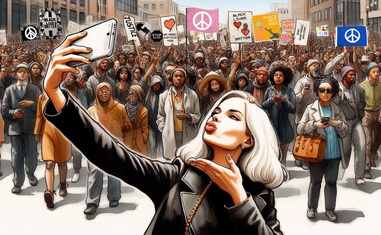The views expressed in our content reflect individual perspectives and do not represent the authoritative views of the Baha'i Faith.
Over the years, I’ve seen expressions of solidarity grow and wane for marginalized groups. As media coverage of injustices increased and popularity heightened, more social media posts from more privileged demographics vocalizing their support would follow suit.
However, when the media coverage for each specific cause lessened, so did the expressions of solidarity. This made me wonder if some allies were only showing concern for oppressed groups because it was popular to do so and not because they were actually committed to dismantling oppressive systems. I then did some research and realized that there was a term for that — performative allyship.
RELATED: How to Be a Better Ally for Racial Justice
Defining Performative Allyship
As many of you likely know, allies are people of more privileged demographics who advocate for victims of discrimination. There are different types of allyship.
Performative allyship is a form of disingenuous and superficial advocacy based on self-gratification, not personal responsibility. It entails actions taken primarily to alleviate personal guilt, to prove one’s lack of prejudice, to cultivate a particular image for others, or to follow a trend.
Between 1935 and 1957, Shoghi Effendi, the Guardian of the Baha’i Faith, wrote:
People today indeed do tend to be very superficial in their thinking, and it would seem as if the educational systems in use are sorely lacking in ability to produce a mature mind in a person who has reached supposedly adult life! All the outside influences that surround the individual seem to have an intensely distracting effect, and it is a hard job to get the average person to do any deep thinking or even a little meditation on the problems facing him and the world at large.
Over and over again Bahá’u’lláh cried out against the heedlessness of humanity, and warns of the fate such an attitude must lead to.
An Example of Performative Allyship in the Workplace
According to the article, “Corporate Performative Allyship: It’s Hurting Your Bottom Line,” by Angela Peacock, published on GP Strategies, “Performative allyship occurs when an organization wants to look like they’re supporting marginalized groups—by calling for or creating allies from their people without supporting their development or allowing them to take action that amounts to real change.”
This often involves some form of tokenism. For example, she explained, “a company hires some people from marginalized groups to improve on their diversity metrics or makes sure the only people of color in the office are in company photographs,” or they may even run “a weeks-long Black History Month campaign on social media without any initiatives or programs” that would solicit actual change and uplift the voices of BIPOC employees within their organization. “In all, performative allyship is a way to look good without actually doing any good.”
As Abdu’l-Baha, one of the central figures of the Baha’i Faith, said in a talk in Paris in 1911:
What profit is there in agreeing that universal friendship is good, and talking of the solidarity of the human race as a grand ideal? Unless these thoughts are translated into the world of action, they are useless.
What Is the Difference Between Performative and Active Allyship?
In order to translate these thoughts into action, it’s helpful to understand the difference between performative and active allyship.
Active allies are committed to working for social justice, regardless of whether causes are trending. They consistently make an effort to use their privilege to support historically oppressed demographics and create lasting, institutional change. They don’t just “talk the talk,” as the saying goes, but also “walk the walk.”
RELATED: 5 Abolitionists Who Show Us What White Allyship Looks Like
Interestingly, Forbes reported on research that people often overestimate their level of allyship. In the article “Are You An Active Or Performative Ally?” Forbes contributor Julie Kratz wrote, “Seventy-seven percent of people think they are being active allies, yet only 10% of women of color cite being sufficiently mentored and/or sponsored.”
So, it’s no surprise that honest introspection, humble acknowledgment, deep curiosity, empathetic engagement, authentic conversations, vulnerable interactions, and courageous responsibilities were the seven active allyship behaviors that Dr. Poornima Luthra identified in her book, “The Art of Active Allyship: 7 Behaviours to Empower You to Push The Pendulum Towards Inclusion At Work.”
Active allyship involves getting out of your comfort zone as you challenge yourself and the status quo. It requires effort and, often, some form of sacrifice. In 1938, when writing about the issue of racial prejudice, Shoghi Effendi wrote:
The ceaseless exertions which this issue of paramount importance calls for, the sacrifices it must impose, the care and vigilance it demands, the moral courage and fortitude it requires, the tact and sympathy it necessitates, invest this problem, which the American believers are still far from having satisfactorily resolved, with an urgency and importance that cannot be overestimated.
Working for social justice is a lifelong but rewarding journey. Read my article “Racial Justice Advocacy: Moving From Ally to Accomplice” to learn how people can move beyond superficial forms of allyship and create lasting institutional change. As Abdu’l-Baha wrote:
Soon will your swiftly passing days be over, and the fame and riches, the comforts, the joys provided by this rubbish-heap, the world, will be gone without a trace. Summon ye, then, the people to God, and invite humanity to follow the example of the Company on high. Be ye loving fathers to the orphan, and a refuge to the helpless, and a treasury for the poor, and a cure for the ailing.
Be ye the helpers of every victim of oppression, the patrons of the disadvantaged. Think ye at all times of rendering some service to every member of the human race. Pay ye no heed to aversion and rejection, to disdain, hostility, injustice: act ye in the opposite way. Be ye sincerely kind, not in appearance only.

















Comments
Sign in or create an account
Continue with Facebookor